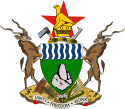- Conservative Alliance of Zimbabwe
-
Zimbabwe 
This article is part of the series:
Politics and government of
Zimbabwe- President
- Vice President
- Prime Minister
- Deputy Prime Minister
- Council of Ministers
- Parliament
- Supreme Court
- 2007 political crisis
- 2008 – 2009 political crisis
- Political parties (ZANU-PF, MDC-T)
- Elections (Electoral Commission)
- Provinces
- Foreign relations
- Human rights
- National flags
The Conservative Alliance of Zimbabwe was the final incarnation of a party formerly called the Republican Front and prior to that the Rhodesian Front. In the immediate post-independence period, the party sought to promote the position of whites in Zimbabwe and did not initially seek support amongst other ethnic groups.
White politics - post independence
White politics in Zimbabwe immediately after independence were mainly involved in contesting 20 reserved "white roll" seats in the Zimbabwe parliament, although some whites joined ZANU (PF). The RF party remained under the dominance of Ian Smith who insisted on keeping its identity as a white party concentrating on issues of importance to whites. The RF and later CAZ did not contest common roll seats in either 1980 or 1985. The inadequacy of this as a political strategy quickly became apparent. Most of the sitting RF MPs in the 1980 to 85 parliament either became independents or defected to ZANU.
Smith's response to this in the 1985 general election was to mount a campaign against the defectors and RF (now renamed CAZ) succeeded in winning 15 of the 20 white seats.[1] The white seats in Parliament were abolished in 1987, although CAZ continued to enjoy limited representation at municipal level. By that time, white led civic groups such as the CZI (Confederation of Zimbabwe Industry) and CFU (Commercial Farmers Union) were openly supporting ZANU.
The adherents of the former Rhodesian Front now had no obvious political purpose. But, they were politically astute (having been the governing party for 20 years) and were well-resourced. Whites in Zimbabwe controlled critical areas of the national economy. White farmers assumed the character of a "landed gentry" and were able to exercise much influence over the black workers on their estates. Whites were a coherent group who could act together to achieve a political purpose. In the new Zimbabwe, conservative white farmers suddenly found a great deal in common with white liberals and civil rights activists.
Whites in Zimbabwe sought to preserve their position in the country by supporting democracy, civil rights, the rule of law and opposing to arbitrary transfer of property through land reforms, quite a transformation from the position that most whites had taken in the period before independence. The whites became very active in Zimbabwean opposition politics.
The ending of reserved white seats in Parliament and the merger of ZANU and ZAPU in 1987 created a situation in which Zimbabwe began to move towards being a one-party state. The leading opponent of this was initially Edgar Tekere who formed the Zimbabwe Unity Movement party (ZUM) to contest elections in 1990. However, ZUM made only limited progress. People had little confidence in Zimbabwe's political parties, were widely seen as opportunistic and faction ridden. Instead, opposition was channelled through civic groups such as the CCJP (Catholic Commission for Justice and Pace in Zmbabwe) and the ZCTU (Zimbabwe Congress of Trade Unions).
In July 1992, Ian Smith chaired a meeting of opposition political groups with a view to forming a political front to oppose ZANU.[2] This meeting was attended by representatives of Rhodesian-era parties including CAZ, UANC and ZANU-Ndonga. It was also attended by ZUM and ZCTU. The Forum for Democratic Reform and the Forum Party (incorporating CAZ) emerged from this. The Forum Party (led by former Chief Justice Enoch Dumbutshena) made little initial impact, coming third place in the 1995 elections with 6% of the vote. Forum attracted support mainly from whites and urban middle class blacks, having a too narrow ideological base to appeal to a mass electorate. However, the concept of a broad-based, non-ethnic, opposition movement was born.
See also
Footnotes
- ^ Rhodesia and Zimbabwe election results
- ^ Encyclopedia of Nations :Zimbabwe
Political parties in Zimbabwe and its antecedents Governing parties Zimbabwe African National Union – Patriotic Front (ZANU–PF) · Movement for Democratic Change – Tsvangirai (MDC–T) · Movement for Democratic Change – Mutambara (MDC–M)Minor parties Zimbabwe African National Union – Ndonga (ZANU–Ndonga) · National Alliance for Good Governance (NAGG) · Zimbabwe People's Democratic Party · Zimbabwe Youth in Alliance (ZYA) · International Socialist Organisation (ISO) · United People's Party (UPP) · Patriotic Union of MaNdebeleland (PUMA) · Zimbabwe African People's Union – Federal Party (ZAPU–FP) · Zimbabwe Development Party (ZDP)Defunct parties Zimbabwe African People's Union (ZAPU) · Zimbabwe African National Union (ZANU) · Rhodesian Front (RF) · Republican Front (RF) · Conservative Alliance of Zimbabwe (CAZ) · Responsible Government Association (RGA) · United Federal Party (UFP) · Rhodesian Action Party (RAP) · Rhodesia Labour Party (RLP) · Southern Rhodesia Communist Party (SRCP) · Southern Rhodesia Liberal Party (SRLP)President Robert Mugabe (ZANU–PF)Prime minister Morgan Tsvangirai (MDC–T)Key people Ndabaningi Sithole (ZANU, ZANU–Ndonga) · Joshua Nkomo (ZAPU) · Arthur Mutambara (MDC–M) · Ian Smith (RF)Armed factions Portal:Politics · List of political parties · Politics of Zimbabwe Categories:- Political parties in Zimbabwe
- Political parties established in 1984
Wikimedia Foundation. 2010.
